Preservation of Maltese LanguageAuthor: Prof. Maurice N. Cauchi M.D., M.Sc., Ph.D., F.R.C.P., F.R.C.Path. The preservation of Maltese language by Maltese migrants and their offspring has been a subject of discussion for several years. I have been asked to discuss three aspects of this topic, namely: 1.How much is Maltese language being used by migrants? 2.Is the Maltese language a help or a hindrance? 3.Are books in Maltese and about Malta reaching Maltese migrants? I shall restrict most of what I have so say to my experience of the Australian situation. 1. How much is the Maltese language being used?The first question is probably the easiest to answer because we have reasonably good statistics, particularly from Census 1996 data, as well as from individual studies carried out since.1 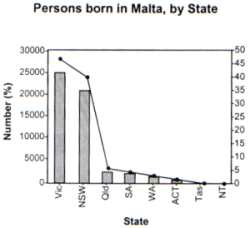
Fig 1 - Number of persons born in Malta now residing in Australia (Census 1006). Columns represent numbers. Continuous line represent percnt of total. The total number of persons born in Malta who were living in Australia in 1996 was 50,879, of whom 47.5% were living in Victoria, 39.7% in N.S.W. and the rest (12.8%) were living in the other States. (Figure 1) According to the 1996 Census, in Australia, a total of 44,674 persons spoke Maltese. The distribution in the different States is given in figure. Victoria accounts for 52% of Maltese-language speakers while N.S.W. account for 39%. The other States account for the rest (9%). 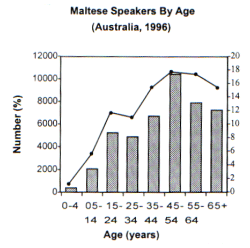
Fig 2 - Age distribution of Maltese speakers. The number is given as columns, the percentage of speakers of any particular age group is shown as the continuous line (with axis on the right). To note from figure 2 that the age of Maltese speakers is not limited to the elderly, but there is a considerable spread, with 28.7% being under the age of 35. (Figure 2) 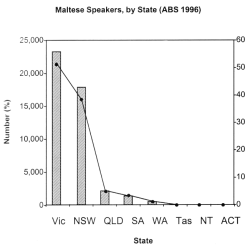
Fig 3 - Maltese speakers by state. Columns represent number of persons who speak Maltese at home. The continuous line represents the percentage of all Maltese speakers living in that particular State. 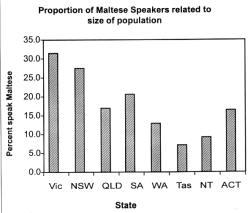
Fig 4 - Proportion of Maltese speakers as a proportion of the size of the population. The number of Maltese speakers given as a proportion of the total number of first generation + number of persons with father born in Malta (Note this excludes those with a mother born in Malta and a father born elsewhere). 2. Is the Maltese language a help or a hindrance?This is very loaded question, one to which there is no direct answer. It is important to distinguish clearly which group within the population are we referring to. There are clearly three different groups of Maltese who may be affected differently in this respect: 1.The first generation migrant, usually an adult who can speak the Maltese language well. However, it is well to bear in mind that a considerable proportion of migrants left Malta at a very young age, well before their pattern of language acquisition was completely established. In this case their grasp of language and its subsequent use would resemble that of the second generation more than that of the first. They are in effect "virtual" second generation. 2.The second generation, (G.2) i.e. those born in a country different from that of their parents. The actual number in this category has actually exceeded that of the first generation. In Australia for instance the number persons belonging to G.2 (i.e. having at least one parent who was born in Malta) is in the region of 120,000, or more than double that of the first generation. As I mentioned already, the number of first-generation migrants who left Malta when still very young should strictly speaking be included in this category from the point of view of language maintenance. This point is hardly ever taken into consideration in census statistics. 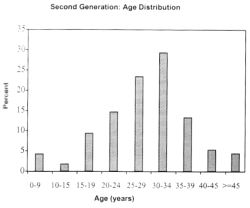
Fig 5 - Second Generation - Age Distribution (Source - Melbourne Survey, Cauchi, 1988) To mention also that the age-range in this group of G.2 migrants is quite wide, with a considerable proportion new reaching the age of 60 and above. (Figure 5: Second Generation: Age Distribution). 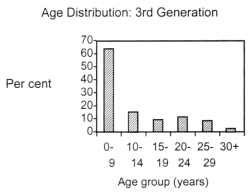
Fig 6 - Third Generation - Age Distribution (Source - Melbourne Survey, Cauchi, 1988) 3.The third generation (G.3.) is defined as those children born overseas one or more of whose grandparents were born in Malta. Many of these persons have a very mixed parentage, with other language groups claiming an equal or greater right to dominance. Their age in this group ranges up to 30 or 40 years of age (Figure 6). Having thus described the various persons affected by this language problem, we should be in a better position now to answer the question posed, that is, whether language maintenance is a help or a hindrance. Maltese Language use by First Generation:It is my experience, supported by the Census question relating to language spoken at home, that G.1. migrants continue to use their first language continuously and effectively for the rest of their lives. One is often amazed to see Maltese language used to a greater extent among Maltese migrant communities than in some quarters in Malta itself, where a foreign language (English or Italian) has all but displaced the vernacular as the language of every-day use. It would be interesting from this point of view to have the equivalent language question in the Maltese census, namely, "what language is spoken at home" in order to determine accurately the degree of language shift in Malta itself. One must mention also the well-known fact that with ageing, one starts losing the grasp of an acquired foreign language, and therefore one is often thrown back on the language learned in infancy. Hence the need for ethnic-specific services within the migrant communities, which becomes more rather than less demanding with the passage of time. It is through the Maltese language that the ageing migrant communicated with family members and friends. It is through Maltese language programmes on radio that they keep in touch with their community. It is this group of people who look forward with such expectation to the television programmes that they get from the home country, reminding them of the younger days of festa and fireworks. I well remember how popular were the videos we had at the Maltese Community Council Library in Melbourne. There is no question in my mind that the Maltese language represents a crucial life-line to the majority of these persons overseas. Having said this, one is therefore surprised to see that there is a quite considerable language shift in the first generation as well (See Kipp 1999). According to the latest census (1996) 36.5% of Maltese-born speak only English at home. It is a well-known phenomenon that the more isolated the Maltese community, the more likely it is to lose the use of Maltese language. The greatest loss of Maltese use occurs in Tasmania (70%, West Australia and Northern Territory (65%), and least in Victoria, 31.3% and N.S.W. 36.5%). This holds particularly for those of younger age, as mentioned already. Younger people tend to lose their language and use the dominant one much more readily than their elders. Maltese language use by G.2The value of Maltese language is more questionable in the second generation. Their first language is English. Many of them can understand some Maltese, which is used by parents to a variable extent in the home. It is the rule rather than the exception, however, that these persons do not by choice speak Maltese themselves, except in very limited circumstances, such as talking to grand-parents who cant speak English. Their grasp of the language is at a low functional level and certainly inadequate for more complex tasks, and is not sufficiently advance to cope at an academic or professional level. To extent that they can communicate with anybody at all, their language skills, albeit minimal can be considered as a positive and useful possession. One must also pose the fact that bi-linguality confers on the person a certain state of mind, a development of the contra-lateral side of the brain. Normally, language is processed by the dominant hemisphere the left side in right handed persons. In bilinguals, the right side is used to process the second language. This has been shown to matter quite significantly in persons afflicted with disorders that involve only one side of the brain, leaving the other side, (and the other language) largely unaffected. This could account for the pliability of the multilingual brain; it appears as if learning a second language prepares the brain to learn a third and even a fourth a facility which mono-linguists find difficult to understand. While the ability to learn several languages is to some extent a question of aptitude, there is no doubt also an element of facilitation. Several attempts have been made to teach Maltese language to children of migrants overseas. In places like Australia, this has on occasion reached a level of recognition au par with other recognised ethnic languages, to the extent that it was taught in primary schools instead of another language like Italian or Japanese. It is at this point that we should ask the question whether teaching Maltese becomes a help or a hindrance. It is really a question of what economists call "opportunity costs". In our case one could argue that subjecting our children to the study of Maltese at school automatically excludes them from earning a second ethnic language, which may be perceived as more economically advantageous, or may be more beneficial academically and professionally. It is for this reason that many Maltese (as well as non-Maltese) parents have objected to the introduction of Maltese in the odd primary school where Maltese children were the majority ethnic group. Language Shift in the Second GenerationLanguage shift can be taken as an indirect measure of the perceived lack of importance of a language by the persons concerned. Language (L.S.) in the second generation can be defined as the percentage of persons born outside Malta with one or both parents born in Malta who can speak only English at home. L.S. for Maltese G.2 is one of the highest in Australia, reaching an average value of 82.1% (See Kipp, 1999).2 In fact this figure reached a value of 92.9% for children of exogenous marriages (where one parent is non-Maltese), compared to 70% for children of endogamous marriages. Obviously, in such households, the use of Maltese is not perceived as of any great benefit, or alternatively, the strain of using another language when one parent (particularly the mother) cannot speak Maltese is considered to be not worth persevering with. Grasp of Maltese Language by the Second GenerationCensus statistics refer to the question relating to "language spoken at home". Many of those who said that they do not speak Maltese at home would still have some degree of knowledge of Maltese language. In fact, in a survey I carried out in 1998, the proportion of G.2 who speak Maltese "moderately" or "well" amounted to 49%. Moreover, the proportion who understood it "well" rose to 64%. This is in contrast to the census finding quoted already where only 18% were stated that they were able to speak Maltese at home. The other side of the question is whether their command of the Maltese language was adequate for more than the basic simple needs such as following the trend of a conversation at home. In the survey I mentioned already, only half of those who admitted to being able to understand it "well" also admitted to being able to speak it well (64% and 32% respectively). One must also add that a much higher level of language command is necessary for more sophisticated use of language (see further Cauchi, 1999).3 The Third GenerationThe age distribution of the third generation (G.3) is hard to obtain from official statistics. In the survey referred to above, 63% of those with a Maltese grandparent were below the age of 10. There was however, a non-negligible number of persons who were over the age of 25. Only 5% of these claimed to be able to speak Maltese well, but up to 37% said that they were able to understand some Maltese (and 14% who could understand it well).1 3. Are Books in Maltese and About Malta Reaching Maltese Migrants?I believe this is an area where there is still a lot to be done. We can consider the problem under two headings: 1.Are Maltese overseas aware of Maltese publications? This is the first necessary proviso for anyone wishing to acquire Maltese books. Yet we find that there is a dearth of information about books published in Malta. There are few overseas Maltese newspapers that carry information about books. I do not know of any regular ethnic radio programme that deals specifically with book availability. So I would hazard a guess that the average migrant has no idea about what is being published in Malta. In the past, books were made available through individuals who made it their job to import Maltese books for migrants. I have in mind in particular persons like Mr Tony Spiteri in Melbourne and Mr Rigu Bovingdon in Sydney. For a long time this was the only significant source of books coming from Malta for distribution in Australia. These days there should be no problem accessing lists of books through the internet. I understand that in Australia over 50% of the population have access to this medium this compares with less than 10% in Malta. Over the past year I have myself started an e-mail list of books published in Malta. This I send to several persons, including radio-announcers in Melbourne. I have also suggested that The Maltese Herald in Sydney might want to publish it. There are also other sources which are very useful, including books about Malta & Gozo, Grazio Malta Virtwali. Gozo.com. etc. I would be happy to pass this information to any other organisation wishing to obtain this information on a regular basis. 2.The second question is: Would Maltese avail themselves of books in Maltese if these were available? This is a much more difficult question. Book reading in Malta and possibly to a larger extent among Maltese overseas is not a popular pastime. The number of books printed per run is usually calculated in their hundreds, and not thousands. This means that less than one per thousand of the population is purchasing any one particular book published in Malta. There are of course library facilities for those who cannot or would not buy books. My experience at the M.C.C.V. library in Melbounre has been that books are not popular, (perhaps with the only exception of an elderly clientele who were devotees of some old-fashioned novels). I must add that even now I can see a ray of hope as we witness school children using library facilities for their school projects. It has always been my view that there should be a well-stocked library in every State where Maltese form a substantial number. This would be useful as a resource both for Maltese as well as for non-Maltese background students wishing to obtain further information, which is often very hard to get from other sources. In conclusion, the number of Maltese-language speakers overseas is dwindling at a rather fast rate. For those who still speak it, it is often the only means of communication, and therefore every effort should be made to ensure that their needs are not neglected. Hence the justification of ethno-specific services that use Maltese language. Maintenance of Maltese culture through use of books and programmes is necessarily more difficult. It is appreciated by the first generation migrants, but hardly at all by the second and subsequent generation. I believe every effort should be made to ensure that this line of communication between the old and the new country should be encouraged and supported to the full. I do not believe that learning Maltese could be a hindrance, except in some very limited situations. It is amusing to see some like C.P. Snow remarking that "The Scandinavians, in particular the Swedes . . . are handicapped by their practical need to denote an inordinate amount of time to foreign languages.4 I do not consider this as a handicap! It is an accomplishment, a mind-expander which mono-linguists find difficult to understand. Finally, I do not believe that throughout the history of migration there has been a sufficiently concentrated effort to inform migrants of the wealth of publications in Maltese and about Malta. I have a feeling that we have lost an opportunity here, and that it is now almost too late to do anything about it. It is still my firm belief, however, that every effort should be made by the Maltese Government and other significant institutions in Malta to help with the onerous task of supplying vital information to our Maltese brethren overseas. In this respect it is pleasing to see significant donations of books being given by the Banks in Malta, as well as by associations of Maltese overseas themselves.5 Notes1. Cauchi M.N., Borland H., Adams R. 1999 Maltese Background Youth Victoria University, Melbourne. 2. Kipp, Sandra: Maltese Language Maintenance in Australia. In: Cauchi et al: "Maltese Background Youth", 1999, Victoria University, Melbourne. 3. Cauchi, M.N., 1999, The Maltese Migrant Experience. 4. The Two Cultures p. 1819. 5. The most recent being a donation of A.U.D. 10,000 to the Maltese library in Melbourne by the Newport Maltese Association. See Cauchi, M., The Times, December 15, 1999, p. 8.
    
| 

![]() .
.